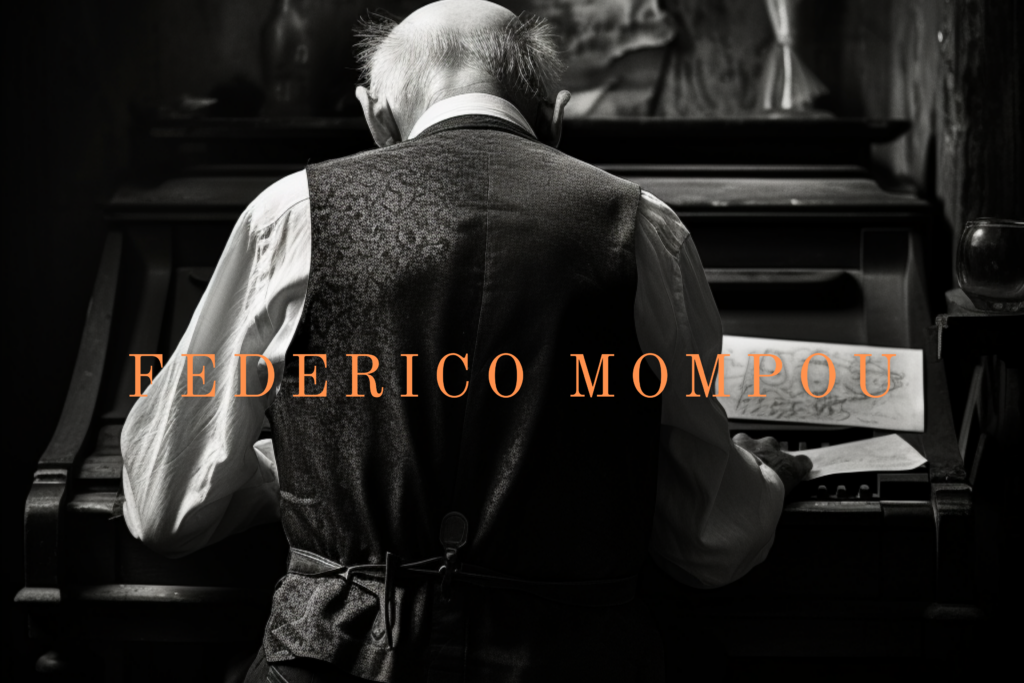Piano Lessons
Federico Mompou: The Poet of the Piano
Federico Mompou: The “Poet of the Piano”
In the annals of 20th-century classical music, few composers have captured the essence of introspection and intimacy as evocatively as Federico Mompou. Often referred to as the Poet of the Piano, Mompou’s compositions, characterized by their simplicity, delicate touch, and profound emotional depth, have left an indelible mark on the world of classical music.
Early Life and Influences
Born in Barcelona in 1893, Federico Mompou showed an early inclination towards music. His initial training was at the Conservatori Superior de Música del Liceu in Barcelona. Later, he moved to Paris, where he studied under Ferdinand Motte-Lacroix. However, it was the ambiance of Paris, with its vibrant artistic community and exposure to French impressionists like Claude Debussy and Erik Satie, that deeply influenced Mompou’s musical style.
Musical Style and Notable Works
Mompou’s music is often described as introspective and intimate. He had a penchant for miniatures – short, evocative pieces that capture a mood or a moment. His compositions, devoid of grandiosity, speak directly to the soul, often evoking a sense of nostalgia, melancholy, or contemplation.
One of Mompou’s earliest and most cherished works is “Impresiones Íntimas” (Intimate Impressions).
Composed between 1911 and 1914, this suite of nine piano miniatures provides a glimpse into the young composer’s evolving style and his deep affinity for introspection. Each piece, though brief, paints a vivid picture, transporting the listener into a world of delicate emotions and profound musings. The pieces are characterized by their transparent textures, lyrical melodies, and an almost meditative quality. Notably, the fifth piece, “Pájaro Triste” (Sad Bird), stands out for its hauntingly beautiful melody, evoking a sense of longing and melancholy. “Impresiones Íntimas” is a testament to Mompou’s belief in the power of simplicity. With minimalistic motifs and a sparse use of the keyboard, he created a world of sound that resonates deeply with the listener’s soul. This work, in many ways, set the tone for Mompou’s later compositions, emphasizing introspection, silence, and emotional depth.
One of Mompou’s most celebrated works is the “Musica Callada” (Silent Music). Inspired by the mystical poetry of Saint John of the Cross, this collection of 28 piano pieces is a profound exploration of silence and its expressive possibilities. The pieces are characterized by their sparse texture, use of silence as a musical element, and profound emotional depth.
Another notable work is “Canciones y Danzas” (Songs and Dances), a series of short pieces that draw inspiration from Catalan folk tunes. These pieces, while rooted in tradition, are infused with Mompou’s unique voice, making them timeless classics.
Legacy and Influence
While Mompou was not as prolific as some of his contemporaries, the quality and depth of his work have ensured his place among the great composers of the 20th century. His influence can be seen in the works of later composers, especially those who value subtlety and introspection over grandeur.
Mompou’s compositions, with their emphasis on simplicity and emotional expression, also resonate deeply with listeners. In a world often dominated by noise and haste, Mompou’s music offers a sanctuary of silence and contemplation.
Conclusion on Federico Mompou
Federico Mompou’s contribution to classical music goes beyond the notes he penned. He taught the world the power of silence, the beauty of simplicity, and the depth of emotion that can be conveyed through music. In his own words:
The best and most profound things are said with silence.
Through his compositions, Mompou masterfully spoke the profound language of silence, leaving a legacy that continues to inspire musicians and listeners alike.

